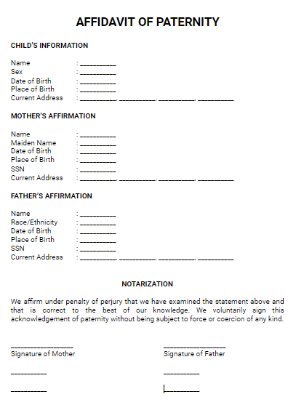- Eviction Notice Forms
- Power of Attorney Forms Forms
- Bill of Sale (Purchase Agreement) Forms
- Lease Agreement Forms
- Rental Application Forms
- Living Will Forms Forms
- Recommendation Letters Forms
- Resignation Letters Forms
- Release of Liability Agreement Forms
- Promissory Note Forms
- LLC Operating Agreement Forms
- Deed of Sale Forms
- Consent Form Forms
- Support Affidavit Forms
- Paternity Affidavit Forms
- Marital Affidavit Forms
- Financial Affidavit Forms
- Residential Affidavit Forms
- Affidavit of Identity Forms
- Affidavit of Title Forms
- Employment Affidavit Forms
- Affidavit of Loss Forms
- Gift Affidavit Forms
- Small Estate Affidavit Forms
- Service Affidavit Forms
- Heirship Affidavit Forms
- Survivorship Affidavit Forms
- Desistance Affidavit Forms
- Discrepancy Affidavit Forms
- Guardianship Affidavit Forms
- Undertaking Affidavit Forms
- General Affidavit Forms
- Affidavit of Death Forms
Paternity Affidavit
When a child is born to unmarried parents, it’s easy for the mother and father to acknowledge the father-child relationship without taking matters to court. Signing a paternity affidavit is a voluntary procedure that allows parents to legally declare who the father of the child is and grant him rights to the child’s welfare. However, it’s also important to be aware of the consequences that this acknowledgement may entail to either party. Read More

Paternity Affidavit
- Who can complete a paternity affidavit?
- Who has custody of the child if an unmarried couple signs a paternity affidavit?
- Can I contest the claims made in a paternity affidavit?
- What happens if you want to cancel a paternity affidavit after the allowed period?
- What to do if you’re a victim of paternity fraud?
When a child is born to unmarried parents, it’s easy for the mother and father to acknowledge the father-child relationship without taking matters to court. Signing a paternity affidavit is a voluntary procedure that allows parents to legally declare who the father of the child is and grant him rights to the child’s welfare. However, it’s also important to be aware of the consequences that this acknowledgement may entail to either party.
What Is a Paternity Affidavit?
A Paternity Affidavit, also known as an Acknowledgment of Parentage, is a sworn document that establishes paternity for an illegitimate child. The law recognizes the man acknowledged in the affidavit as the legal father of the child, with or without DNA results or any other medical evidence to prove this information. The mother and father of the child may sign this affidavit at the hospital within 72 hours from when the child was born or at a later time at their local health department.
As for husbands or presumed fathers who believe or can attest that they are not the biological father of the child, an affidavit of non-paternity serves the opposite purpose. With this affidavit, a person can have their name removed from the child’s birth certificate or medical records and revoke certain rights and/or duties associated with this matter.
How to Create a Paternity Affidavit in Five Easy Steps
Contrary to what many believe, you don’t need to hire a lawyer to draft a paternity affidavit. Below are a few guidelines that will help you prepare the document yourself and spare you from the extra costs and effort.
Establish Your Purpose
Apart from securing a father’s rights to the welfare of an illegitimate child, other instances where a paternity affidavit can be useful include the issuance of a new birth certificate with the Affiant recognized as the child’s father or the modification of a child support order for legal consideration. While it isn’t necessary to specify every single reason for writing the affidavit, it can still help you determine what to include in the document for proper conveyance and clarity.
Identify the Parties Involved
The affidavit must contain the Affiant’s full legal name and other supporting details for authentication. The full name of the child must also be disclosed for identification purposes, whether or not the child had been registered under the father’s surname.
Provide Relevant Information
Note that paternity affidavits differ in every state. A brief explanation detailing the effect, purpose, or authority of the affidavit will also be necessary for the recipient’s consideration is one of the primary components of a paternity (or non-paternity) affidavit. Make sure you have sufficient documentation to prove the legitimacy of these claims, such as valid IDs, test results, and medical records.
Fact Check Your Details
Before signing or submitting your affidavit, take the time to review the information contained in the document. Spelling errors or mistakes of fact can lead to problems down the road, which will likely need another legal document to counter or address such issues.
Also, remember to include a sworn statement acknowledging the truth and accuracy of the claims made in the affidavit.
Sign and Notarize the Document
Check if your state laws require a notarized affidavit; otherwise, an acknowledgment from a witness would be acceptable. The latter is often more common in situations where the biological parents of the child are able to establish paternity within 72 hours from the date and time of birth.
FAQs
Who can complete a paternity affidavit?
The biological mother and father of the child must sign the affidavit to establish paternity. However, there are instances where the mother may still be married to another person at the time of and between conception and birth. Without legal separation, the person that the mother is married to will be the legal father of the child. To disestablish paternity, the biological father must file a petition and meet court requirements for approval.
Who has custody of the child if an unmarried couple signs a paternity affidavit?
As a rule in most states, children born out of wedlock are automatically under the custody of their mother. The law often favors the birth giver and grants the mother complete authority to make decisions regarding the welfare of the child, even with the existence of a paternity affidavit. Should the father wish to pursue parental rights, he may set a shared custody arrangement by undergoing proper legal proceedings with the assistance of a family lawyer.
Can I contest the claims made in a paternity affidavit?
It can be devastating for a man to presume paternity and later find out that such claims are false following the release of medical evidence or a woman’s admission to the fraud. Fortunately, most jurisdictions allow parties to cancel the affidavit within 60 days from the date of signing. The man can file for the withdrawal in court and provide concrete evidence to prove that the claims made in the affidavit are false.
What happens if you want to cancel a paternity affidavit after the allowed period?
A person may challenge a paternity affidavit after 60 days, provided that the reason behind the revocation is on the basis of fraud duress or material mistake of fact, but it won’t be an easy process. There are terms and conditions that a person must adhere to in order to pursue this withdrawal, which can vary from case to case and state to state.
What to do if you’re a victim of paternity fraud?
Paternity fraud is a serious matter that has become quite common in the United States. Because DNA testing isn’t mandatory before signing a paternity affidavit, some men find themselves in a troubling situation of financially supporting a child that isn’t theirs. While there are ways to legally revoke the rights and obligations acquired through the affidavit, seeking legal assistance is necessary to determine what one can do to avoid or minimize any form of liability.
A paternity affidavit may seem simple, but the weight that it carries and bestows on a mother and a presumed father is not something that many people immediately recognize. Thus, make sure you educate yourself about what the affidavit means for you and the child’s future before signing the document, especially when you’re in doubt.
